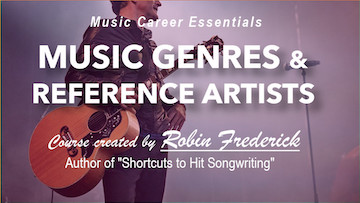
I got a question recently from a songwriter who is torn between two very different song genres —Pop and Contemporary Folk. He loves both and sees the strengths in both. But because he can’t decide which to focus on, he’s having trouble getting started and working on a song. Which style is it going to be?
Which genre am I writing in?
The whole question of choosing a song genre can be frustrating, especially if you’re drawn to a couple of the big ones – like Pop and Folk. Every style—from Pop, Country, and Rock to R&B, Folk, and Blues—has a different approach to melody, lyrics, and production. Veering between two styles within a single song can be a disaster. And working on a Pop song while wondering if maybe it should be a Folk song can distract you from the things you should be focusing on.
Targeting a song genre helps you build an audience and gives you an edge when it comes time to market your song to the music industry. It’s an important issue and one that every serious songwriter has to confront sooner or later. So, what do you do? How do you choose? Here are some ideas that might help.
1. Find out more about the song genres you’re interested in
Studying a genre, getting familiar with the range of lyric themes, language style, chords, melodic rhythms, etc. will help you stay within the genre and write songs that appeal to listeners who are fans of that style.
Spend some quality time listening to and studying successful songs in the genres you’re interested in. Try to stick to recent songs because that’s what listeners and the music industry are currently interested in. Listening to current, successful songs is a great songwriting exercise all by itself.
Check out the current list of Top 100 songs available for free on Billboard.com. The Spotify charts are available here. On Amazon Prime Music click in the SEARCH box for a list of genres. On Apple Music click on GENRES. Select a genre you’re interested in and look for current hits.Go through the top twenty songs or so on a few of the charts. It might take a while to find songs you like or you might find a few right away.
2. Try out a song genre
I usually recommend focusing on one genre at a time, mastering it, then expanding into another area. But if you’d like to test a couple genres before deciding which one to tackle first, try this. I’ll use the Pop and Folk genres in this example.
POP – Choose a recent Pop song you like and use the chord progression and song structure as a template to write a song of your own. If you want, you can write to a Karaoke track. Karaoke-Version.com has some good tracks you can buy, download, then write to. Try to find one that doesn’t have background vocals.
Write at least a verse and chorus of your own to the track. Of course, you can write a whole song if you want to. Don’t worry about getting it perfect, just get an idea down and record a vocal to the track.
INDIE FOLK – Use a radio-friendly Folk hit, like Passenger’s “Let Her Go,” “I Will Wait” by Mumford and Sons, or “Gone, Gone, Gone” by Phillip Phillips. Use the song’s structure and chord progression as the basis for a song of your own. You can play the chords on keyboard or guitar or use a karaoke track. Write at least a verse and chorus of an original lyric and melody.
Then ask yourself the following questions…
Did one of the two songs you wrote appeal to you more than the other?
Did you feel you had more of the skills, knowledge, and confidence needed to write one song or the other?
Do you feel there are more lyric ideas and themes you want to explore in one style or the other?
Were you more creative, free, or inspired when writing one or the other of the songs?
How did the character of the singer feel to you? Was it a natural fit? Could you identify with the character?
Be realistic
Make a list of the resources you’ll need to record a solid, competitive demo of each song. Is one style easier or more affordable than the other? Aside from the song, do you have the musical skills or sample libraries and software you would need to complete a pitchable demo?
Being realistic about your ability to finish and pitch a song within a budget will help you decide which genre to start with. It doesn’t mean you’ll always write exclusively in that genre. Just that you can started to earn money and build a track record more easily. When you have some money coming in , more contacts, and more experience, you can begin to create songs and pitch them in the new genre.
Remember: Every skill you learn and practice in one genre will help you understand another and master it more quickly. It’s not “either/or.” It’s simply a matter of choosing your starting point. You can do this.

